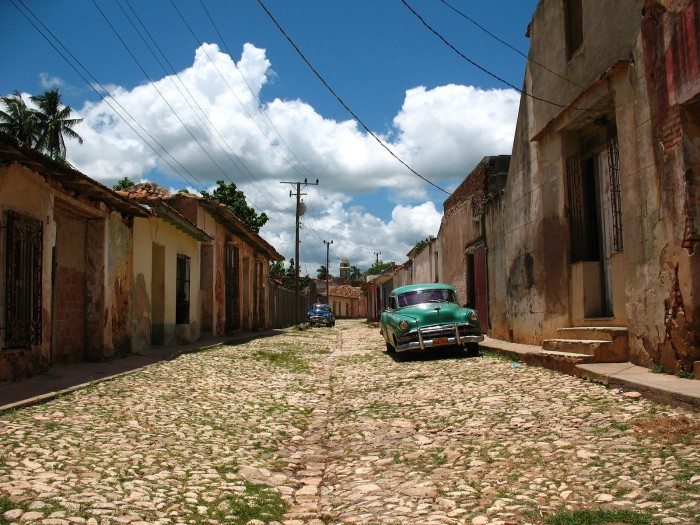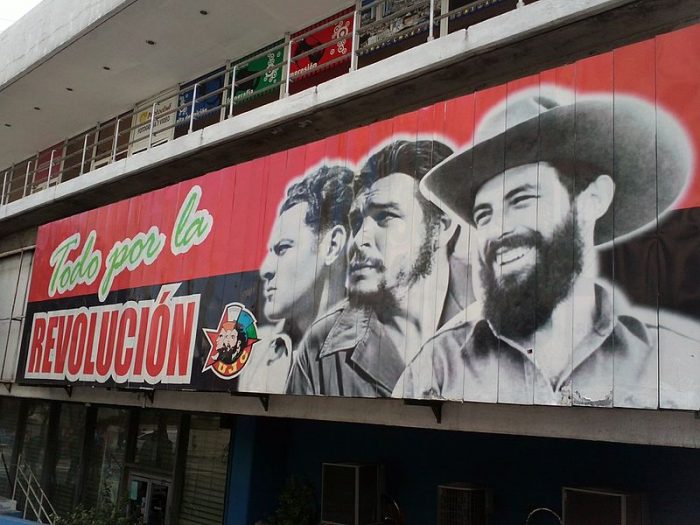Whenever I see the image of Cuba that is shown here in the United States, it strikes me as faulty. You know the one—there are as many different versions as there are photographers snapping shots, but they all tell the same story. An emaciated, dark-skinned man grins at the camera, his teeth either missing or yellowed or crooked. Next to him, a woman wears a dress and chanclas. Maybe a hair wrap. Her face is turned from the camera toward some emblem of poverty—a dusky vintage car, a small bodega, a child wearing only a diaper. Behind them, dilapidated buildings guard a glittering, idyllic ocean.
I’m aware this poverty exists. It’s partly if not wholly a product of the stubborn embargo, but these forlorn photographs never quite capture the Cuba I know. The raucous Cuba that is carrying on multiple, rapid-fire conversations all at once, so many sometimes it seems everyone is talking to themselves. The Cuba fueled by swaying hips, congrí, and family. The Cuba I’ve met only on U.S. soil, but that I’ve also heard in the stories of my abuelos, and seen hung on the walls of my mother’s apartment. The Cuba that I carry hidden in my genes.
Growing up, the hardest part of a standardized test was the Census form. I never knew what to check for race. I wanted to choose “White,” because that’s what I saw in the mirror, but the “Non-Hispanic” parenthetical next to it acted like a repelling magnet. When it came time to apply for college aid, I felt guilty for ticking “Hispanic,” like I was taking money from a student who really earned it. It didn’t matter that my mother emigrated from Cuba as a teenager. I was so politically, physically, and aesthetically estranged from my heritage that it felt like a lie.
My mother and her family immigrated to the United States under refugee status in 1966. I was born in 1988. The U.S.-Cuban embargo has existed my entire life. I sometimes wonder, if my heritage were a simple road-trip or plane fare away, if all I needed was a passport to visit my family back home, would I have had an easier time identifying as Latin American?
These types of identity crises don’t blare in the forefront all the time. Nearly thirty, I am now comfortable checking the “Hispanic-Cuban” box on the forms (or Latino, if the forms are up-to-date). When I look in the mirror, I no longer see lips that are just a little too big, or worry that my skin is a shade more olive than my white friends. Sometimes I consider my passing privilege, and what life will be like for my youngest daughter, whose skin and hair are darker than mine. I am more than a little concerned for the welfare of Latinos in this country as a whole, but I don’t constantly obsess over the intersection of my Cuban and U.S. upbringings. Most days, I just live my life.
But every once in a while, something reminds me that I am, ancestrally, a stranger in a strange land.
Did you know that Hurricane Irma slammed into Cuba before making its way to Florida? That Havana is still recovering from flooding, or that many of those old buildings from the photographs are now piles of rubble? That people died? If this is the first you’re hearing of it, don’t beat yourself up. There’s been little U.S. media coverage about the hurricane’s effect on Cuba.
The State Department claims they are not sending aid because “Cuba hasn’t asked for it.” According to the Miami Herald, however, the Cuban Foreign Ministry opened an account for receiving aid, and Mariela Castro Espín, the daughter of Cuban President Raul Castro, solicited U.S. donations through Facebook. That may not be the kind of request the State Department needs, but it’s still significant.
Cuban political figures have historically shunned U.S. aid. The fact that they are now reaching out for our assistance tells us something about the country’s level of need. That should matter. Nonetheless, Facebook deleted the post (they later reinstated it with an apology, but the damage was done), and the Herald is urging U.S. citizens not to make donations. Apparently, the embargo raises questions about the legality of helping Cubans.
It’s these kinds of events that make me question my place as a Cuban-heritage American citizen. I still have family in Cuba; it’s disenfranchising to hear them discussed like pawns in an overly-complicated party game that’s long overdue to call a draw. Obama began normalizing Cuban relations in his second term. This past summer, Trump halted that process, even though it was on the heels of Fidel Castro’s late 2016 death. Most of the United States shrugged and moved on, but those of us who check that “Hispanic-Cuban” box are still wondering when and how our dual cultures will be reconciled.
The fathers of the U.S.-Cuban trade embargo are dead, but the U.S.-born children of Cuban refugees continue to grapple with identities that have been ghosted by this decades-old feud.
Now, I am once again caught between—watching while the island where my mother was born repairs itself without the help of the country where she gave birth to me.
***
Elizabeth Brico is the author of the Betty’s Battleground blog. She tweets from @elizabethbrico.




